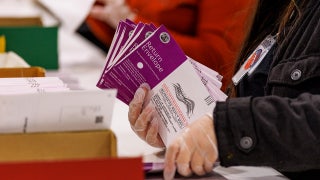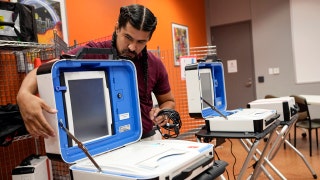If you don't know much about the late-Sen. Frank Church (D-ID), it's likely you'll hear his name invoked a great deal in the coming days in the aftermath of the operation that killed Osama bin Laden.
Church served four terms in the Senate, retiring in 1981. He chaired the Senate Foreign Relations Committee and ran for president in 1976. But Church is best known for leading the Church Committee, a special panel of lawmakers which probed undercover American intelligence missions. Other members of the Church Committee included former Vice President Walter Mondale, former Senate Majority Leader Howard Baker (R-TN), legendary Sen. Barry Goldwater (R-AZ) and Sen. Phil Hart (D-MI), for whom the Hart Senate Office Building is named in Washington.
Church served in Army intelligence during World War II. That's the same time President Franklin Delano Roosevelt founded the Office of Strategic Service, best known as the OSS. The OSS was the forerunner to the Central Intelligence Agency and carried out clandestine U.S. operations around the world.
But the 1960s and 1970s proved to be a tumultuous period for American government. The U.S. was bogged down in Vietnam and the specter of Watergate pierced the Nixon presidency. There were serious questions as to how the Nixon Administration used the intelligence services to potentially spy in Americans. In December, 1974, New York Times investigative reporter Seymour Hersh published an exhaustive piece that described covert intelligence operations. It specifically spelled out efforts by U.S. intelligence interests to kill foreign political figures and thwart various regimes around the world.
In 1975, the Senate empanelled the Church Committee as part of a specific effort to investigate alleged misuse of American intelligence resources. The Church Committee evaluated ways to enhance Congressional oversight of the American intelligence community and reform stealth operations. The Church Committee was the precursor for the House and Senate Intelligence Committees which are now established venues for Congress to keep tabs on America's spooks.
But the Church Committee was not without controversy.
President Ford's Chief of Staff Donald Rumsfeld was concerned the Church Committee could inhibit the broad authority under which U.S. intelligence community operated. Many in intelligence circles felt that the findings of the Church Committee would unfairly restrict the U.S. from developing human assets overseas. And there were worries that Congressional oversight could harness American intelligence resources that targeted political leaders in Congo, the Dominican Republic, Vietnam, Chile and Cuba. Some fretted that Congress could thwart undercover operations to kill or capture those who posed a threat to the U.S. or western interests.
Clandestine operations like the one that killed Osama bin Laden on Sunday.
U.S. intelligence interests have had information on the site in Abbotabad, Pakistan where bin Laden was killed since last August. Perhaps this underscores why the U.S. was so concerned about the various Wikileaks document dumps over the past year. And due to the work of the Church Committee, expect lawmakers to insist on full, thorough briefings on how the bin Laden raid went down.
Granted, lawmakers are ecstatic that bin Laden is dead. But there will inevitably be questions after an operation of this magnitude, perhaps the most significant in the annals of the spy services.
Information about bin Laden operation was fragmentary overnight, with word trickling out about how key lawmakers learned of the assassination. After all, House Speaker John Boehner (R-OH) led a group of House members to Islamabad and Peshawar, Pakistan just two weeks ago. While nearly all members of that delegation contacted by Fox said they were unaware of any pending operation in Pakistan, Rep. Joe Heck (R-NV) says that they did "bring up the name" of bin Laden during their travels and discussions with military officials.
Congressional sources indicate this is a partial list of the questions lawmakers will want answers to:
- What is the U.S.'s relationship with Pakistan after bin Laden was found to be hiding on Pakistani soil?- What did Pakistan know and when did they know it?- Can Pakistan be trusted?- What is the "collateral damage" and enhanced terrorism risk after killing such an iconic figure like bin Laden?- How was the intelligence about bin Laden obtained? - Did the U.S. conduct the operation "by the book?"- Did the U.S. unearth other potential terrorist plots with this raid?- Were any U.S. intelligence assets exposed by this operation and at what cost?
This is not to suggest there will be Congressional second-guessing of the Obama Administration's decision to carry out this operation. But because of the Church Committee, there is an automatic demand for Congressional oversight.
Expect it to start immediately.
Already on the books for Monday was a pre-scheduled primer for freshmen House members about intelligence by CIA Director Leon Panetta at headquarters in Langley, VA.
The House Intelligence Committee had already scheduled one of its frequent, closed-door "hotspot" briefings for its members late Monday afternoon. Expect the bin Laden operation to be front and center for that.
A few lawmakers raised the possibility that senior intelligence and defense officials should conduct an "en masse" behind-the-scenes briefing for all Members of Congress. This would be along the lines of what Defense Secretary Robert Gates and Secretary of State Hillary Rodham Clinton did on Capitol Hill in March to answer the questions about U.S. intervention in Libya.
Regardless, expect a series of both open and closed hearings from a variety of committees in the coming weeks about this historic turn of events.
But unlike some perceptions of the Church Committee in the mid-70s, don't expect a witch hunt.
During the time of the Church Committee, the U.S. was on the heels of Watergate and Vietnam. Government credibility sunk to one of its lowest ebbs. The U.S. was involved in war that many found hard to explain.
For this inquiry, lawmakers won't be evaluating American efforts to assassinate the leaders of Congo or Chile.
Instead, lawmakers will study what went into killing the man responsible for taking the lives of nearly 3,000 people at the World Trade Center, the Pentagon and in Shanksville, PA.
Which is a lot different from what the Church Committee was investigating in the 1970s.











































